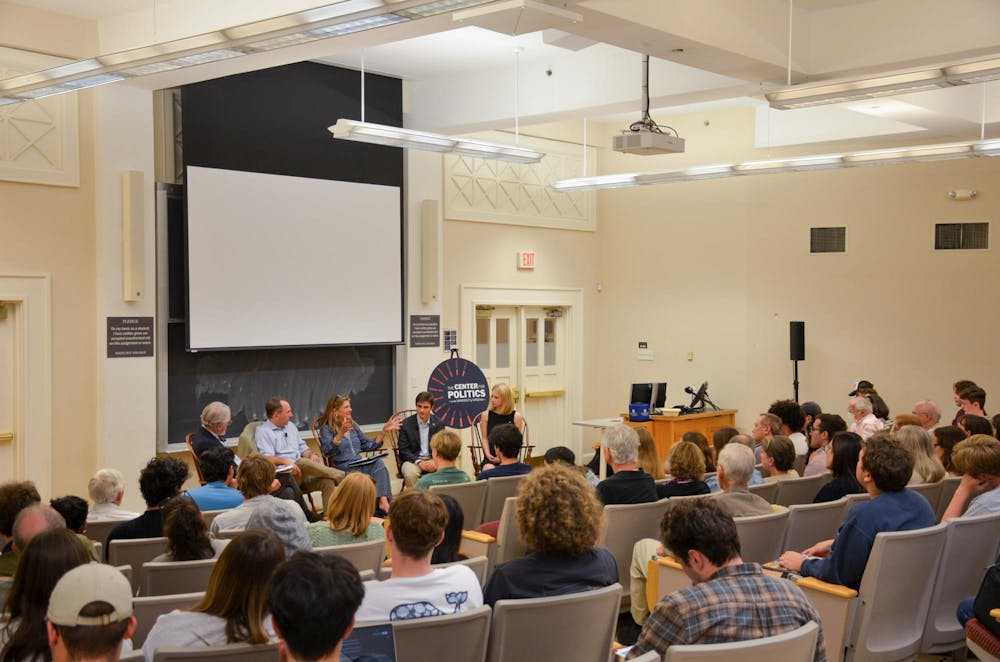The Jefferson Literary and Debating Society, in coordination with the Center for Politics and the Blue Ridge Center, hosted a forum on the state of free speech at the University Monday evening in Minor Hall. The forum focused on the “Compact for Excellence in Higher Education,” which was sent to University leadership by the Department of Education Oct. 1.
The Compact sent to the University by the federal government includes a promise of preferred funding under the condition that the University abide by certain conditions, such as viewpoint neutrality, a tuition freeze for the next five years and the screening of prospective international students.
The event consisted of a moderated discussion between two members of the Society — second-year College student Sophia Pareti and fourth-year College student Jackson Ciocca — and Associate Politics Professor Gerard Alexander and Associate Commerce Professor Sherri Moore. The conversation was moderated by Jeff Schapiro, Center for Politics Scholar who also covered government and politics for the Richmond Times-Dispatch for nearly 40 years, and ended with a question and answer section.
The Jefferson Society is the oldest continuously debating society in American higher education founded 1825. The Society discusses a wide variety of topics with the aim of keeping art and literature alive.
When asked about the Compact by Schapiro, Moore — a member of the presidential search committee — started discussing its impact by commenting that the Compact itself is an overreach of the federal government's use of power. She also pointed out inconsistencies in conservative ideals in this action. The Compact aims to impart more control over higher education institutions, which opposes the conservative principle of robust state rights.
“It’s shocking to see the overreach of the federal government,” Moore said. “Routinely, conservative parties have been [supportive of] increased state rights … but this is a very chilling conflict … and the sad part is it is being tied to funds.”
Ciocca cited issues in section four of the Compact, which restricts faculty members from commenting on “social or political events” except those that have a direct impact on the University. He discussed how the Compact could negatively affect education at the University by limiting discussion in classrooms.
“Politics are part of our history, right? How can we study a thing like history or politics if we make no reference to current events? We don't study history and politics so that we can change the past. We study them so we can change the present.” Ciocca said.
One of the points of the Compact asks universities to maintain institutional neutrality, and Alexander said he supports the notion of institutional neutrality, so long as it is instituted and monitored by the individual institutions and not the federal government.
With the Compact heavily centering around freedom of expression for University-affiliated individuals, the conversation shifted to the protection of hate speech, especially as it ties to recent protests over the Israeli-Palestinian conflict.
Moore elaborated further on the discussion of free speech in response and connected it to events that occurred in past academic years.
“There were big protests about [former] Vice President [Mike] Pence coming to Grounds to speak … [but it] seems to me people want to hear the speech they want to hear,” Moore said.
Alexander also discussed debates he has noticed regarding the Trump administration and potential censorship of free speech and its connection to previous presidential administrations, such as the Biden administration.
“If you are concerned in [this] era about what sometimes seems like this eagerness to lunge at regulated speech … you ought to be concerned,” Alexander said. “But you also should have been concerned under President Biden and the pressures of the federal government to try to get Facebook and Twitter, social media platforms, to kick off or de-amplify people who were dissidents on the issues of the causes of COVID-19 and treatments.”
During the event, one student asked whether the Board of Visitors was doing an adequate job of upholding the values of the University. Ciocca shared his view on what he believes students and Virginia residents should do if they are not pleased with the actions of the Board, whether it be their response to the Compact or any other decisions they make for the University.
“If you disagree with the action of the current Board of Visitors, you do have the ability to remove members of the Board,” Ciocca said. “We have an election right now [where] one candidate has openly supported the current Board of Visitors, and we have one who has been exceptionally critical. Every student at the University can vote in the state of Virginia.”
In an interview after the event, Sean Chung, a fourth-year international student in the College of Arts and Sciences, discussed his personal connection to the things outlined in the Compact, being an international student, and how that could affect his ability to attend graduate school.
“For me as a University student, I guess [my biggest concern] with it would be the screening for American values, because I am an international student, and that directly influences my ability to apply for graduate school in the future,” Chung said
Ciocca concluded by discussing the importance of engaging in dialogue among community members and the necessity of effective political discourse on these pressing issues.
“It is our responsibility … When you look at how people are able to change minds by engaging in what are probably very uncomfortable, very difficult conversations, … that, to me, is the answer to those [issues] — conversation,” Ciocca said.







